人教版九年级全册Unit 1 How can we become good learners?Section A 2a-2d分层练习(含答案)
文档属性
| 名称 | 人教版九年级全册Unit 1 How can we become good learners?Section A 2a-2d分层练习(含答案) | 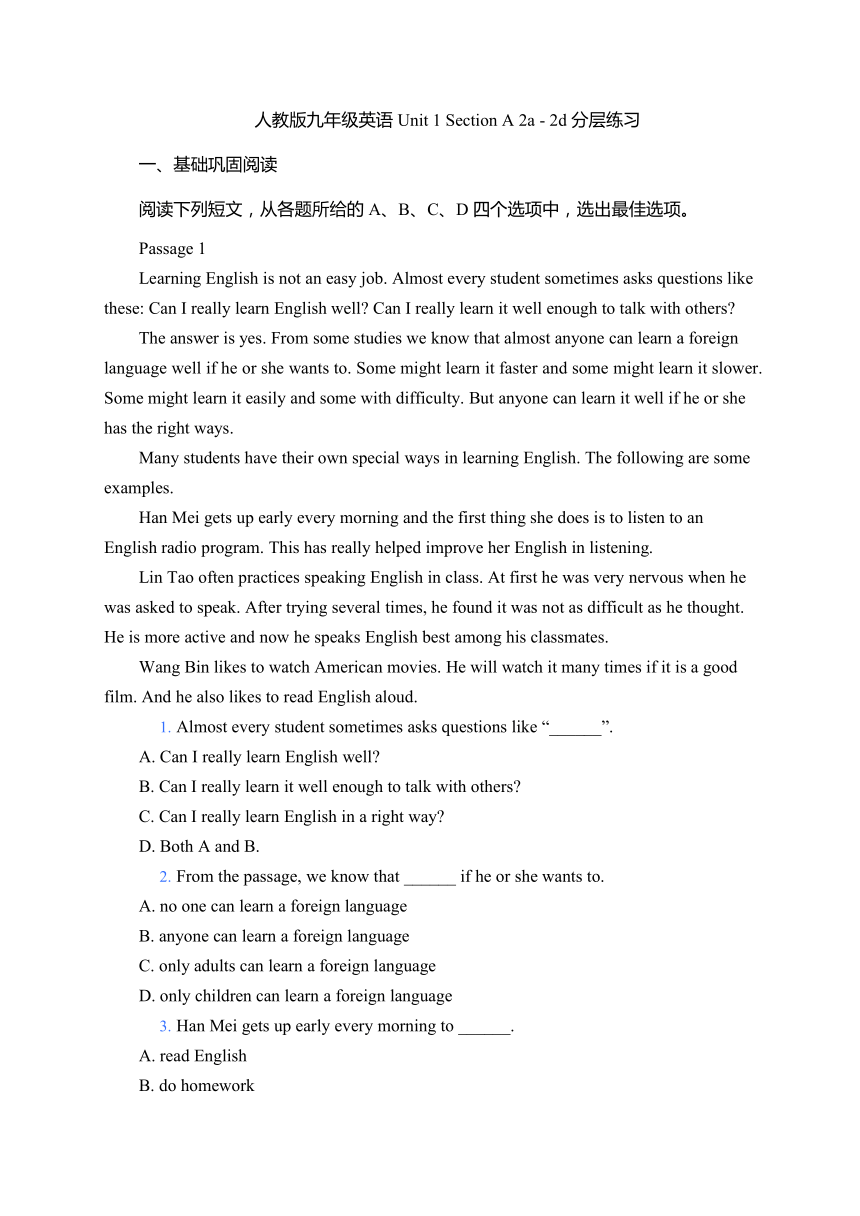 | |
| 格式 | docx | ||
| 文件大小 | 23.5KB | ||
| 资源类型 | 教案 | ||
| 版本资源 | 人教新目标(Go for it)版 | ||
| 科目 | 英语 | ||
| 更新时间 | 2025-02-15 21:52:28 | ||
图片预览

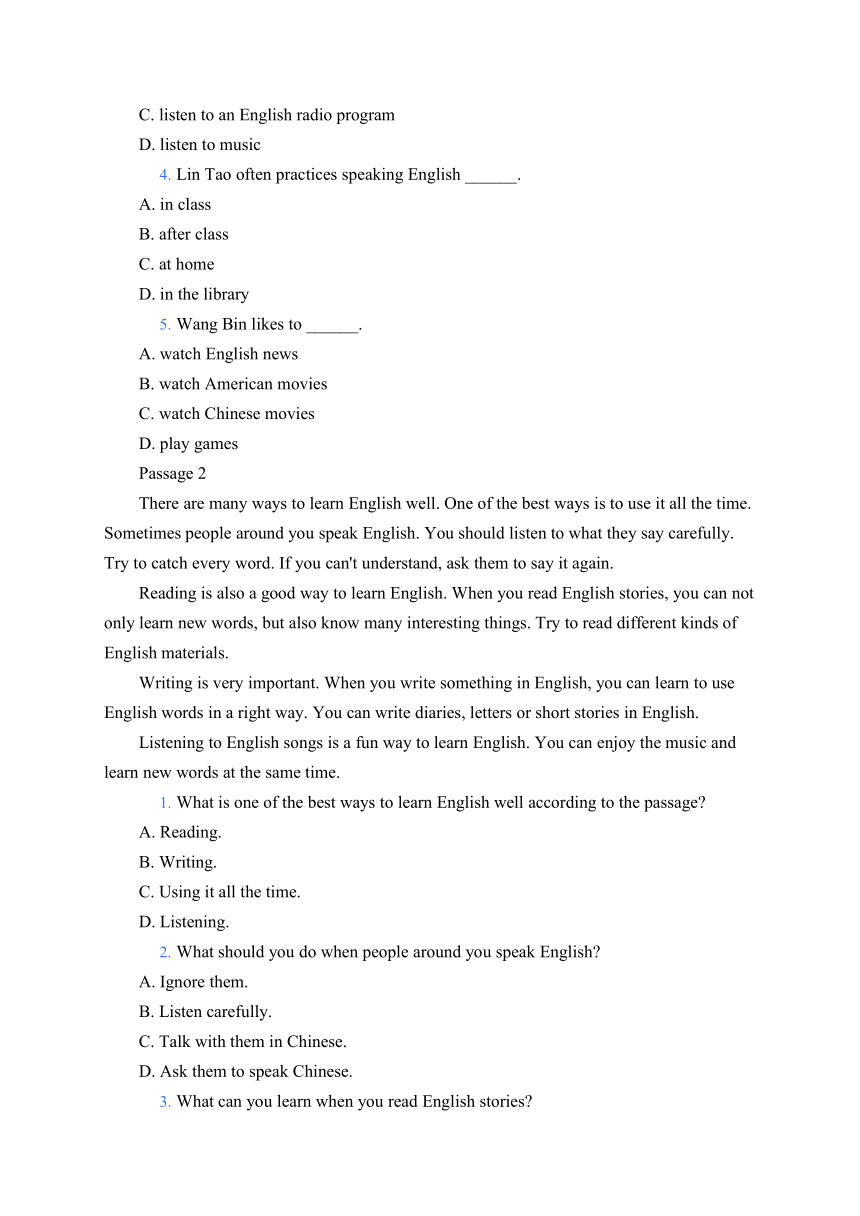
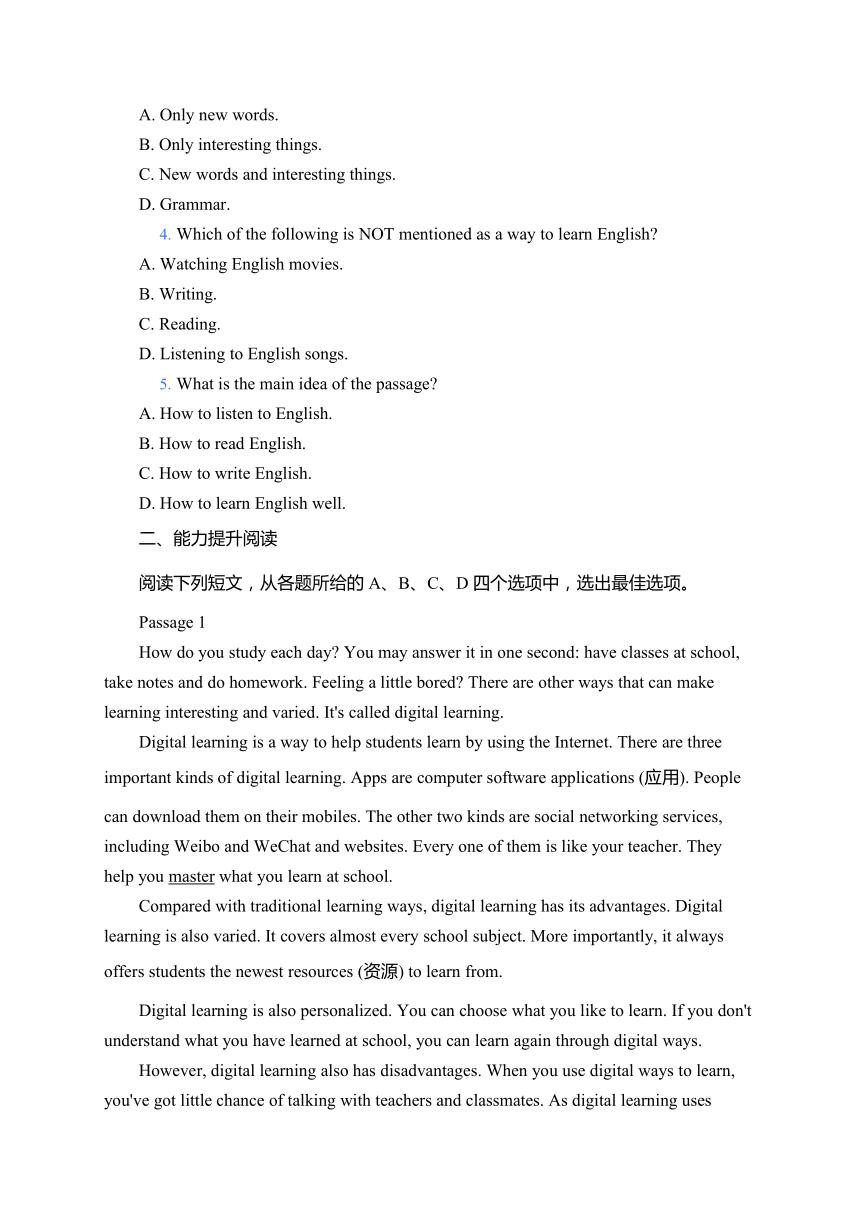
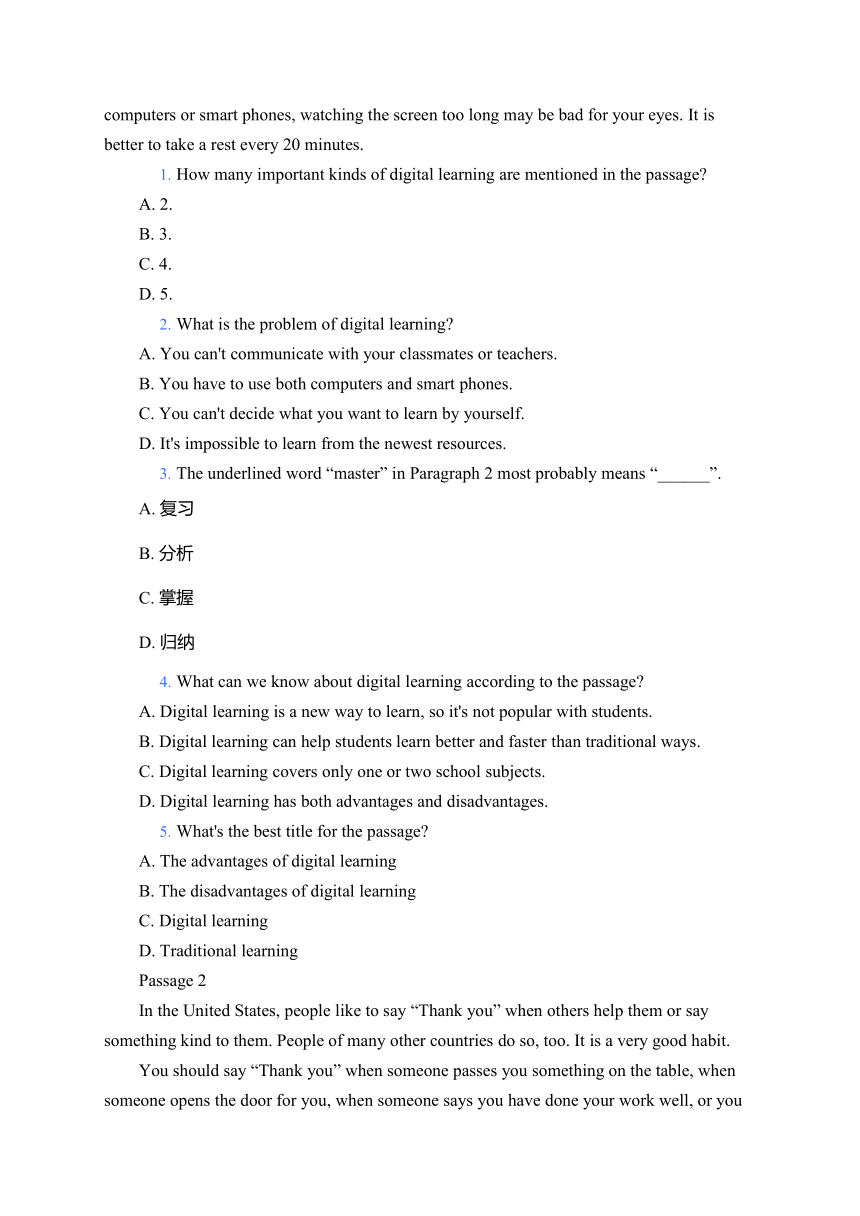
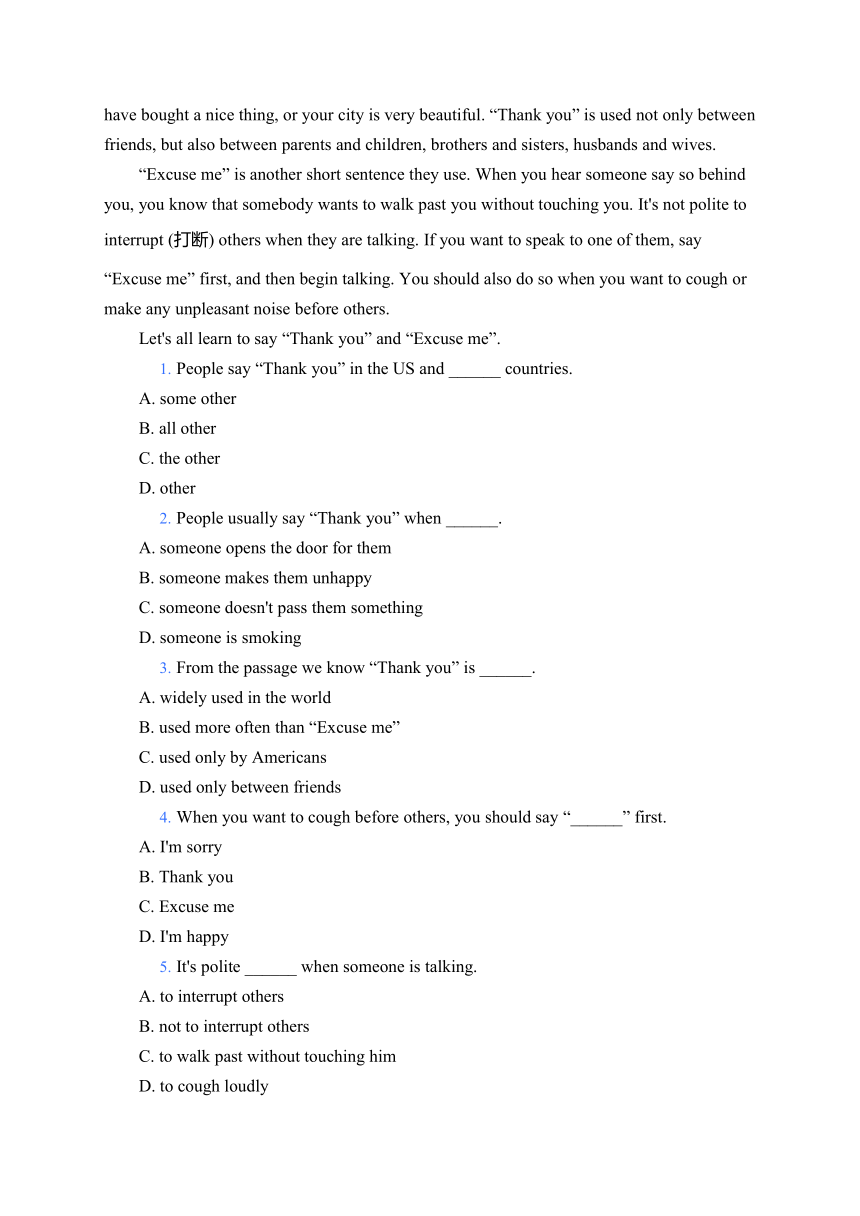
文档简介
人教版九年级英语 Unit 1 Section A 2a - 2d 分层练习
一、基础巩固阅读
阅读下列短文,从各题所给的 A、B、C、D 四个选项中,选出最佳选项。
Passage 1
Learning English is not an easy job. Almost every student sometimes asks questions like these: Can I really learn English well Can I really learn it well enough to talk with others
The answer is yes. From some studies we know that almost anyone can learn a foreign language well if he or she wants to. Some might learn it faster and some might learn it slower. Some might learn it easily and some with difficulty. But anyone can learn it well if he or she has the right ways.
Many students have their own special ways in learning English. The following are some examples.
Han Mei gets up early every morning and the first thing she does is to listen to an English radio program. This has really helped improve her English in listening.
Lin Tao often practices speaking English in class. At first he was very nervous when he was asked to speak. After trying several times, he found it was not as difficult as he thought. He is more active and now he speaks English best among his classmates.
Wang Bin likes to watch American movies. He will watch it many times if it is a good film. And he also likes to read English aloud.
Almost every student sometimes asks questions like “______”.
A. Can I really learn English well
B. Can I really learn it well enough to talk with others
C. Can I really learn English in a right way
D. Both A and B.
From the passage, we know that ______ if he or she wants to.
A. no one can learn a foreign language
B. anyone can learn a foreign language
C. only adults can learn a foreign language
D. only children can learn a foreign language
Han Mei gets up early every morning to ______.
A. read English
B. do homework
C. listen to an English radio program
D. listen to music
Lin Tao often practices speaking English ______.
A. in class
B. after class
C. at home
D. in the library
Wang Bin likes to ______.
A. watch English news
B. watch American movies
C. watch Chinese movies
D. play games
Passage 2
There are many ways to learn English well. One of the best ways is to use it all the time. Sometimes people around you speak English. You should listen to what they say carefully. Try to catch every word. If you can't understand, ask them to say it again.
Reading is also a good way to learn English. When you read English stories, you can not only learn new words, but also know many interesting things. Try to read different kinds of English materials.
Writing is very important. When you write something in English, you can learn to use English words in a right way. You can write diaries, letters or short stories in English.
Listening to English songs is a fun way to learn English. You can enjoy the music and learn new words at the same time.
What is one of the best ways to learn English well according to the passage
A. Reading.
B. Writing.
C. Using it all the time.
D. Listening.
What should you do when people around you speak English
A. Ignore them.
B. Listen carefully.
C. Talk with them in Chinese.
D. Ask them to speak Chinese.
What can you learn when you read English stories
A. Only new words.
B. Only interesting things.
C. New words and interesting things.
D. Grammar.
Which of the following is NOT mentioned as a way to learn English
A. Watching English movies.
B. Writing.
C. Reading.
D. Listening to English songs.
What is the main idea of the passage
A. How to listen to English.
B. How to read English.
C. How to write English.
D. How to learn English well.
二、能力提升阅读
阅读下列短文,从各题所给的 A、B、C、D 四个选项中,选出最佳选项。
Passage 1
How do you study each day You may answer it in one second: have classes at school, take notes and do homework. Feeling a little bored There are other ways that can make learning interesting and varied. It's called digital learning.
Digital learning is a way to help students learn by using the Internet. There are three important kinds of digital learning. Apps are computer software applications (应用). People can download them on their mobiles. The other two kinds are social networking services, including Weibo and WeChat and websites. Every one of them is like your teacher. They help you master what you learn at school.
Compared with traditional learning ways, digital learning has its advantages. Digital learning is also varied. It covers almost every school subject. More importantly, it always offers students the newest resources (资源) to learn from.
Digital learning is also personalized. You can choose what you like to learn. If you don't understand what you have learned at school, you can learn again through digital ways.
However, digital learning also has disadvantages. When you use digital ways to learn, you've got little chance of talking with teachers and classmates. As digital learning uses computers or smart phones, watching the screen too long may be bad for your eyes. It is better to take a rest every 20 minutes.
How many important kinds of digital learning are mentioned in the passage
A. 2.
B. 3.
C. 4.
D. 5.
What is the problem of digital learning
A. You can't communicate with your classmates or teachers.
B. You have to use both computers and smart phones.
C. You can't decide what you want to learn by yourself.
D. It's impossible to learn from the newest resources.
The underlined word “master” in Paragraph 2 most probably means “______”.
A. 复习
B. 分析
C. 掌握
D. 归纳
What can we know about digital learning according to the passage
A. Digital learning is a new way to learn, so it's not popular with students.
B. Digital learning can help students learn better and faster than traditional ways.
C. Digital learning covers only one or two school subjects.
D. Digital learning has both advantages and disadvantages.
What's the best title for the passage
A. The advantages of digital learning
B. The disadvantages of digital learning
C. Digital learning
D. Traditional learning
Passage 2
In the United States, people like to say “Thank you” when others help them or say something kind to them. People of many other countries do so, too. It is a very good habit.
You should say “Thank you” when someone passes you something on the table, when someone opens the door for you, when someone says you have done your work well, or you have bought a nice thing, or your city is very beautiful. “Thank you” is used not only between friends, but also between parents and children, brothers and sisters, husbands and wives.
“Excuse me” is another short sentence they use. When you hear someone say so behind you, you know that somebody wants to walk past you without touching you. It's not polite to interrupt (打断) others when they are talking. If you want to speak to one of them, say “Excuse me” first, and then begin talking. You should also do so when you want to cough or make any unpleasant noise before others.
Let's all learn to say “Thank you” and “Excuse me”.
People say “Thank you” in the US and ______ countries.
A. some other
B. all other
C. the other
D. other
People usually say “Thank you” when ______.
A. someone opens the door for them
B. someone makes them unhappy
C. someone doesn't pass them something
D. someone is smoking
From the passage we know “Thank you” is ______.
A. widely used in the world
B. used more often than “Excuse me”
C. used only by Americans
D. used only between friends
When you want to cough before others, you should say “______” first.
A. I'm sorry
B. Thank you
C. Excuse me
D. I'm happy
It's polite ______ when someone is talking.
A. to interrupt others
B. not to interrupt others
C. to walk past without touching him
D. to cough loudly
三、拓展提高阅读
阅读下列短文,从各题所给的 A、B、C、D 四个选项中,选出最佳选项。
Passage 1
Learning a foreign language is not a matter of reading some grammar rules or some vocabulary words - although those are important activities not to be ignored. Acquiring (获得) a language is learning a skill, not a body of information. It's much more like learning to swim or ride a bike than it is like learning about the Second World War. That is, you must not only understand the ideas and have information at hand, but also make your body accustomed (习惯) to using that information in physical (身体的) activity. In the case of learning a second language, the physical activity is speaking, listening, writing, and reading.
You need, then, not only to memorize and understand, but also to practice!
Here are a few suggestions on effective practice/study techniques.
Make your mouth or hand do what your mind is learning. Study out loud. Study with a friend, practicing speaking and listening. Try to write sentences or a short paragraph using the skills you have practiced with your own lips.
Study day by day. You cannot get by in a foreign language course by cramming (突击学习) at the last minute. You may be able to “learn” vocabulary items that way, but you cannot teach your mouth to use them in sentences.
Sometimes go back and review “old” topics and vocabulary. Language learning is cumulative (积累的). The new skills you learn build upon the old skills you learned in the past. The more you “recycle” familiar information and skills, the better you will be able to take in new ones.
Don't be afraid to make mistakes. Self - consciousness (自我意识) can be a strong barrier to learning a language. Perhaps part of the reason small children readily learn languages is that they are not afraid of making mistakes.
From the passage we know that to learn a foreign language is ______.
A. only a matter of reading some grammar rules
B. only a matter of learning some vocabulary words
C. mainly to get a good knowledge of the Second World War
D. more like learning to swim or ride a bike than learning about the Second World War
The writer's main purpose in writing this passage is to ______.
A. tell us the importance of learning a foreign language
B. tell us the importance of reading
C. give us some suggestions on effective study techniques
D. tell us how to study grammar
The underlined word “barrier” means “______”.
A. 桥梁
B. 障碍
C. 纽带
D. 基础
Which of the following is NOT true according to the passage
A. You should study day by day.
B. You should go back and review what you have learned.
C. You should study by cramming at the last minute.
D. You should practice speaking, listening, writing and reading.
“You cannot get by in a foreign language course by cramming at the last minute” means “______”.
A. It is impossible to learn a foreign language well at the last minute
B. It is possible to learn a foreign language well at the last minute
C. You can learn a lot of things at the last minute
D. You can learn a foreign language well by cramming at the last minute
Passage 2
There are some skills for students to listen to the teacher in class, which means you're going to have to practice it. Just as you would have to practice basketball to be a better player, you also have to practice listening. How to listen in school
One of the things you need to do is to make sure that your mind doesn't wander (漫游). It's easy to start thinking about other things, especially when you're not interested in the subject. So make yourself pay attention to what the teacher is saying.
Next, listen for the main ideas. If you want to catch every little piece of information, you'll feel tired and bored. You'll also need to look at the teacher. Not only does this show respect (尊重) to the teacher, it also helps prevent your mind from wandering. Looking at the teacher makes it easier for you to focus on what he or she is saying.
Another thing you can do is to take notes. By doing this, you'll be able to review what you've learned after class. Notes can also help you remember information when it's time for a test.
Listening isn't always easy, but if you follow these simple steps, you'll be much more successful in your classes.
Which of the following can help you avoid wandering in class
A. Following the teacher's words.
B. Thinking about other things.
C. Looking at the blackboard.
D. Taking down the notes.
If you want to catch every little piece of information, you'll ______.
A. be a top student
B. not be afraid of exams
C. feel tired and bored
D. be good at listening
Taking notes in class can help you ______.
A. avoid making mistakes
B. review what you've learned
C. show respect to the teacher
D. focus on the teacher's words
Which is the best title for the passage
A. How to Listen in School
B. How to Play Basketball
C. How to Take Notes
D. How to Learn English
The writer's purpose of writing the passage is to ______.
A. encourage students to listen carefully in class
B. help students solve problems
C. tell students the importance of listening
D. make students interested in study
答案
一、基础巩固阅读
Passage 1
D
B
C
A
B
Passage 2
C
B
C
A
D
二、能力提升阅读
Passage 1
B
A
C
D
C
Passage 2
A
A
A
C
B
三、拓展提高阅读
Passage 1
D
C
B
C
A
Passage 2
A
C
B
A
A
一、基础巩固阅读
阅读下列短文,从各题所给的 A、B、C、D 四个选项中,选出最佳选项。
Passage 1
Learning English is not an easy job. Almost every student sometimes asks questions like these: Can I really learn English well Can I really learn it well enough to talk with others
The answer is yes. From some studies we know that almost anyone can learn a foreign language well if he or she wants to. Some might learn it faster and some might learn it slower. Some might learn it easily and some with difficulty. But anyone can learn it well if he or she has the right ways.
Many students have their own special ways in learning English. The following are some examples.
Han Mei gets up early every morning and the first thing she does is to listen to an English radio program. This has really helped improve her English in listening.
Lin Tao often practices speaking English in class. At first he was very nervous when he was asked to speak. After trying several times, he found it was not as difficult as he thought. He is more active and now he speaks English best among his classmates.
Wang Bin likes to watch American movies. He will watch it many times if it is a good film. And he also likes to read English aloud.
Almost every student sometimes asks questions like “______”.
A. Can I really learn English well
B. Can I really learn it well enough to talk with others
C. Can I really learn English in a right way
D. Both A and B.
From the passage, we know that ______ if he or she wants to.
A. no one can learn a foreign language
B. anyone can learn a foreign language
C. only adults can learn a foreign language
D. only children can learn a foreign language
Han Mei gets up early every morning to ______.
A. read English
B. do homework
C. listen to an English radio program
D. listen to music
Lin Tao often practices speaking English ______.
A. in class
B. after class
C. at home
D. in the library
Wang Bin likes to ______.
A. watch English news
B. watch American movies
C. watch Chinese movies
D. play games
Passage 2
There are many ways to learn English well. One of the best ways is to use it all the time. Sometimes people around you speak English. You should listen to what they say carefully. Try to catch every word. If you can't understand, ask them to say it again.
Reading is also a good way to learn English. When you read English stories, you can not only learn new words, but also know many interesting things. Try to read different kinds of English materials.
Writing is very important. When you write something in English, you can learn to use English words in a right way. You can write diaries, letters or short stories in English.
Listening to English songs is a fun way to learn English. You can enjoy the music and learn new words at the same time.
What is one of the best ways to learn English well according to the passage
A. Reading.
B. Writing.
C. Using it all the time.
D. Listening.
What should you do when people around you speak English
A. Ignore them.
B. Listen carefully.
C. Talk with them in Chinese.
D. Ask them to speak Chinese.
What can you learn when you read English stories
A. Only new words.
B. Only interesting things.
C. New words and interesting things.
D. Grammar.
Which of the following is NOT mentioned as a way to learn English
A. Watching English movies.
B. Writing.
C. Reading.
D. Listening to English songs.
What is the main idea of the passage
A. How to listen to English.
B. How to read English.
C. How to write English.
D. How to learn English well.
二、能力提升阅读
阅读下列短文,从各题所给的 A、B、C、D 四个选项中,选出最佳选项。
Passage 1
How do you study each day You may answer it in one second: have classes at school, take notes and do homework. Feeling a little bored There are other ways that can make learning interesting and varied. It's called digital learning.
Digital learning is a way to help students learn by using the Internet. There are three important kinds of digital learning. Apps are computer software applications (应用). People can download them on their mobiles. The other two kinds are social networking services, including Weibo and WeChat and websites. Every one of them is like your teacher. They help you master what you learn at school.
Compared with traditional learning ways, digital learning has its advantages. Digital learning is also varied. It covers almost every school subject. More importantly, it always offers students the newest resources (资源) to learn from.
Digital learning is also personalized. You can choose what you like to learn. If you don't understand what you have learned at school, you can learn again through digital ways.
However, digital learning also has disadvantages. When you use digital ways to learn, you've got little chance of talking with teachers and classmates. As digital learning uses computers or smart phones, watching the screen too long may be bad for your eyes. It is better to take a rest every 20 minutes.
How many important kinds of digital learning are mentioned in the passage
A. 2.
B. 3.
C. 4.
D. 5.
What is the problem of digital learning
A. You can't communicate with your classmates or teachers.
B. You have to use both computers and smart phones.
C. You can't decide what you want to learn by yourself.
D. It's impossible to learn from the newest resources.
The underlined word “master” in Paragraph 2 most probably means “______”.
A. 复习
B. 分析
C. 掌握
D. 归纳
What can we know about digital learning according to the passage
A. Digital learning is a new way to learn, so it's not popular with students.
B. Digital learning can help students learn better and faster than traditional ways.
C. Digital learning covers only one or two school subjects.
D. Digital learning has both advantages and disadvantages.
What's the best title for the passage
A. The advantages of digital learning
B. The disadvantages of digital learning
C. Digital learning
D. Traditional learning
Passage 2
In the United States, people like to say “Thank you” when others help them or say something kind to them. People of many other countries do so, too. It is a very good habit.
You should say “Thank you” when someone passes you something on the table, when someone opens the door for you, when someone says you have done your work well, or you have bought a nice thing, or your city is very beautiful. “Thank you” is used not only between friends, but also between parents and children, brothers and sisters, husbands and wives.
“Excuse me” is another short sentence they use. When you hear someone say so behind you, you know that somebody wants to walk past you without touching you. It's not polite to interrupt (打断) others when they are talking. If you want to speak to one of them, say “Excuse me” first, and then begin talking. You should also do so when you want to cough or make any unpleasant noise before others.
Let's all learn to say “Thank you” and “Excuse me”.
People say “Thank you” in the US and ______ countries.
A. some other
B. all other
C. the other
D. other
People usually say “Thank you” when ______.
A. someone opens the door for them
B. someone makes them unhappy
C. someone doesn't pass them something
D. someone is smoking
From the passage we know “Thank you” is ______.
A. widely used in the world
B. used more often than “Excuse me”
C. used only by Americans
D. used only between friends
When you want to cough before others, you should say “______” first.
A. I'm sorry
B. Thank you
C. Excuse me
D. I'm happy
It's polite ______ when someone is talking.
A. to interrupt others
B. not to interrupt others
C. to walk past without touching him
D. to cough loudly
三、拓展提高阅读
阅读下列短文,从各题所给的 A、B、C、D 四个选项中,选出最佳选项。
Passage 1
Learning a foreign language is not a matter of reading some grammar rules or some vocabulary words - although those are important activities not to be ignored. Acquiring (获得) a language is learning a skill, not a body of information. It's much more like learning to swim or ride a bike than it is like learning about the Second World War. That is, you must not only understand the ideas and have information at hand, but also make your body accustomed (习惯) to using that information in physical (身体的) activity. In the case of learning a second language, the physical activity is speaking, listening, writing, and reading.
You need, then, not only to memorize and understand, but also to practice!
Here are a few suggestions on effective practice/study techniques.
Make your mouth or hand do what your mind is learning. Study out loud. Study with a friend, practicing speaking and listening. Try to write sentences or a short paragraph using the skills you have practiced with your own lips.
Study day by day. You cannot get by in a foreign language course by cramming (突击学习) at the last minute. You may be able to “learn” vocabulary items that way, but you cannot teach your mouth to use them in sentences.
Sometimes go back and review “old” topics and vocabulary. Language learning is cumulative (积累的). The new skills you learn build upon the old skills you learned in the past. The more you “recycle” familiar information and skills, the better you will be able to take in new ones.
Don't be afraid to make mistakes. Self - consciousness (自我意识) can be a strong barrier to learning a language. Perhaps part of the reason small children readily learn languages is that they are not afraid of making mistakes.
From the passage we know that to learn a foreign language is ______.
A. only a matter of reading some grammar rules
B. only a matter of learning some vocabulary words
C. mainly to get a good knowledge of the Second World War
D. more like learning to swim or ride a bike than learning about the Second World War
The writer's main purpose in writing this passage is to ______.
A. tell us the importance of learning a foreign language
B. tell us the importance of reading
C. give us some suggestions on effective study techniques
D. tell us how to study grammar
The underlined word “barrier” means “______”.
A. 桥梁
B. 障碍
C. 纽带
D. 基础
Which of the following is NOT true according to the passage
A. You should study day by day.
B. You should go back and review what you have learned.
C. You should study by cramming at the last minute.
D. You should practice speaking, listening, writing and reading.
“You cannot get by in a foreign language course by cramming at the last minute” means “______”.
A. It is impossible to learn a foreign language well at the last minute
B. It is possible to learn a foreign language well at the last minute
C. You can learn a lot of things at the last minute
D. You can learn a foreign language well by cramming at the last minute
Passage 2
There are some skills for students to listen to the teacher in class, which means you're going to have to practice it. Just as you would have to practice basketball to be a better player, you also have to practice listening. How to listen in school
One of the things you need to do is to make sure that your mind doesn't wander (漫游). It's easy to start thinking about other things, especially when you're not interested in the subject. So make yourself pay attention to what the teacher is saying.
Next, listen for the main ideas. If you want to catch every little piece of information, you'll feel tired and bored. You'll also need to look at the teacher. Not only does this show respect (尊重) to the teacher, it also helps prevent your mind from wandering. Looking at the teacher makes it easier for you to focus on what he or she is saying.
Another thing you can do is to take notes. By doing this, you'll be able to review what you've learned after class. Notes can also help you remember information when it's time for a test.
Listening isn't always easy, but if you follow these simple steps, you'll be much more successful in your classes.
Which of the following can help you avoid wandering in class
A. Following the teacher's words.
B. Thinking about other things.
C. Looking at the blackboard.
D. Taking down the notes.
If you want to catch every little piece of information, you'll ______.
A. be a top student
B. not be afraid of exams
C. feel tired and bored
D. be good at listening
Taking notes in class can help you ______.
A. avoid making mistakes
B. review what you've learned
C. show respect to the teacher
D. focus on the teacher's words
Which is the best title for the passage
A. How to Listen in School
B. How to Play Basketball
C. How to Take Notes
D. How to Learn English
The writer's purpose of writing the passage is to ______.
A. encourage students to listen carefully in class
B. help students solve problems
C. tell students the importance of listening
D. make students interested in study
答案
一、基础巩固阅读
Passage 1
D
B
C
A
B
Passage 2
C
B
C
A
D
二、能力提升阅读
Passage 1
B
A
C
D
C
Passage 2
A
A
A
C
B
三、拓展提高阅读
Passage 1
D
C
B
C
A
Passage 2
A
C
B
A
A
同课章节目录
- Unit 1 How can we become good learners.
- Section A
- Section B
- Unit 2 I think that mooncakes are delicious!
- Section A
- Section B
- Unit 3 Could you please tell me where the restroom
- Section A
- Section B
- Unit 4 I used to be afraid of the dark.
- Section A
- Section B
- Unit 5 What are the shirts made of?
- Section A
- Section B
- Review of Units 1-5
- Unit 6 When was it invented?
- Section A
- Section B
- Unit 7 Teenagers should be allowed to choose their
- Section A
- Section B
- Unit 8 It must belong to Carla.
- Section A
- Section B
- Unit 9 I like music that I can dance to.
- Section A
- Section B
- Unit 10 You're supposed to shake hands.
- Section A
- Section B
- Review of Units 6-10
- Unit 11 Sad movies make me cry.
- Section A
- Section B
- Unit 12 Life is full of the unexpected
- Section A
- Section B
- Unit 13 We're trying to save the earth!
- Section A
- Section B
- Unit 14 I remember meeting all of you in Grade 7.
- Section A
- Section B
- Review of Units 11-14
